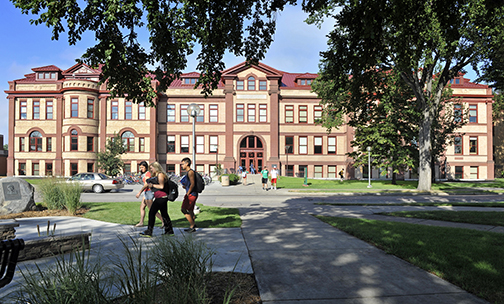
Community Development
This is an archived copy of the 2020-21 catalog. To access the most recent version of the catalog, please visit http://bulletin.ndsu.edu.
Program Description
The Department of Sociology and Anthropology, in cooperation with the Department of Agribusiness and Applied Economics, offers a master's degree in Community Development. The degree is a multi-institutional, multi-disciplinary, online program in conjunction with the Great Plains Interactive Distance Education Alliance (IDEA). Other institutions participating in this program include Iowa State University, Kansas State University, the University of Nebraska-Lincoln, and South Dakota State University.
The primary audience for this program is community economic development officials and specialists already employed in the field.
The program requires a total of 36 credit hours, including 16 credits (six courses) of core courses, 15 credits in two of the four track areas, and up to six credits of thesis. The four track areas include Building Economic Capacity, Natural Resource Management, Working with Native Communities, and Non-profit Leadership.
Program Objectives
The objectives of the Community Development graduate degree program are to:
- Increase the skills, knowledge, and competencies of community economic development officials who are currently employed and have limited opportunity to participate in an on-campus degree program.
- Provide graduate training for individuals entering the community economic development career field who require training/degrees for career advancement.
- Enhance the community economic development skills, knowledge, and competencies of individuals working with Native American communities, natural resource-based communities, non-profit organizations, and/or state and local government.
A total of 36 credits are required for the master's degree program. Students will write a thesis or complete a creative component (Plan B) to capstone the degree program, which will be worth six credit hours. The student's schedule of courses must be approved by the faculty adviser and the campus coordinator. Students may select either a Master of Science (M.S.) or Master of Arts (M.A.) option. The M.A. option requirement normally includes two (2) years of a foreign language. This requirement can be satisfied with undergraduate courses and/or a proficiency examination.
Students will be required to take all of the six core courses and an additional 15 credits selected from at least two tracks.
There are presently four tracks that have been developed from which students may choose. These include:
- Building Economic Capacity
- Natural Resource Management
- Working with Native Communities
- Non-profit Leadership
| Code | Title | Credits |
|---|---|---|
| Core Courses Credits | 18 | |
| Foundations in Community Development | ||
| Principles and Strategies of Community Change | ||
| Community Development II: Organizing for Community Change | ||
| Community Analysis: Introduction to Methods | ||
| Community and Regional Economic Policy and Analysis | ||
| Community Natural Resource Management | ||
| Electives | 12-18 | |
| CED 752 | Basic Grant Development and Management | 3 |
| CED 721 | Introduction to Native Community Development | 3 |
| CED 723 | Building Native Community/Economic Capacity | 3 |
| CED 733 | Sustainable Communities | 3 |
| CED 741 | Economic Development Strategies and Programs | 3 |
| CED 745 | Land Management Planning | 3 |
| CED 761 | Government, Politics, & Community Development | 3 |
| CED 753 | Not-for-profit Management | 3 |
| CED 755 | Community Leadership and Capacity Building | 3 |
| CED 763 IMMIGRANTS AND COMMUNITIES | Course CED 763 IMMIGRANTS AND COMMUNITIES Not Found | 3 |
| CED 758 EVALUATION OF ORGANIZATIONS AND PROGRAMS | Course CED 758 EVALUATION OF ORGANIZATIONS AND PROGRAMS Not Found | 3 |
| CED 746 HOUSING AND DEVELOPMENT PROGRAMS | Course CED 746 HOUSING AND DEVELOPMENT PROGRAMS Not Found | 3 |
| CED 756 COMMUNITY ENGAGEMENT | Course CED 756 COMMUNITY ENGAGEMENT Not Found | 3 |
| Plan A or B option | ||
| Master's Thesis | ||
or CED 797 | Course CED 797 Not Found | |
| Plan C | ||
| The Plan C option requires 36 credits of coursework only. | ||
